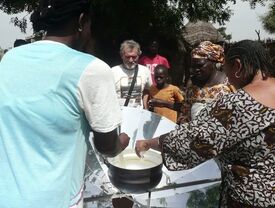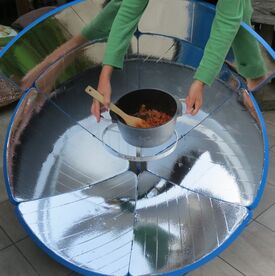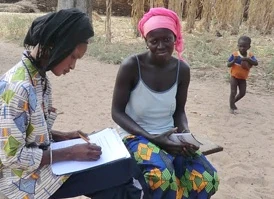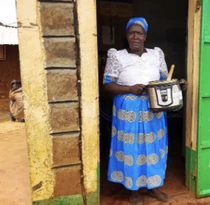Paul Hedrick (talk | contribs) mNo edit summary |
Tom Sponheim (talk | contribs) Tag: sourceedit |
||
| (18 intermediate revisions by 3 users not shown) | |||
| Line 1: | Line 1: | ||
{{GoogleTranslateLinks}} |
{{GoogleTranslateLinks}} |
||
| ⚫ | |||
| − | |||
| + | <table cellspacing="2"> |
||
| ⚫ | |||
| + | <tr> |
||
| + | <td valign="top" width="45%">__TOC__</td> |
||
| + | <td valign="top" width="55%" style="padding:10px;"> |
||
| + | [[File:Presentation Movie SolSuffit|thumb|420px|none]] |
||
| ⚫ | |||
| + | </table> |
||
==Events== |
==Events== |
||
{{CalendarAndPastEvents}} |
{{CalendarAndPastEvents}} |
||
| + | =={{HeadingNews}}== |
||
| − | ==News and Recent Developments== |
||
| + | *{{NewJan16}}'''January 2016:''' [http://valhallamovement.com/senegal-launches-program-transition-14000-traditional-villages-ecovillages Senegal Turning 14,000 Villages Into Ecovillages] - ''Valhalla'' |
||
| + | |||
*'''August 2014: UNHCR recruiting Senior Energy Officer for Senegal''' - [http://www.unhcr.org/53d6140e9.html Read more...] |
*'''August 2014: UNHCR recruiting Senior Energy Officer for Senegal''' - [http://www.unhcr.org/53d6140e9.html Read more...] |
||
| − | [[File:Cucinare_con_il_Sole,_first_solar_cooking,_1-21-14.jpg|thumb| |
+ | [[File:Cucinare_con_il_Sole,_first_solar_cooking,_1-21-14.jpg|thumb|275px|Cooking the first solar cooked meal in Sessene, [[Senegal]].]] |
| − | *'''November 2013:''' [[Cucinare con il Sole]] is a volunteer organization founded in 2006 by |
+ | *'''November 2013:''' [[Cucinare con il Sole]] is a volunteer organization founded in 2006 by Ottorino Saccon, a teacher and craftsman, based in Santa Lucia di Piave TV, [[Italy]]. They produce [[parabolic solar cooker]]s in Italy, and have been introducing solar cooking to villages throughout central [[Africa]], making 3-4 trips to Africa each year. They have worked with over thirty groups in workshops with typically 10 - 20 participants. At Sessene, fifteen kilometers from the city of Thies in [[Senegal]], villagers assemble their first solar cooker. Soon after, in the shade of a baobab mother, they share a meal of cooked rice and vegetables. |
[[File:SolarCooker_Eco3_new_pot_suppport,_1-24-13.jpg|thumb|275px|SolarCooker Eco3 new cookpot support]] |
[[File:SolarCooker_Eco3_new_pot_suppport,_1-24-13.jpg|thumb|275px|SolarCooker Eco3 new cookpot support]] |
||
| Line 16: | Line 24: | ||
*'''March 2013: First KoZon-SPS solar cooking project in Senegal''' - Wilma Goppel, project coordinator for the [[KoZon Foundation]], began demonstrating solar cooking technology in December to the women in Ndondol and staff of Caritas using the [[CooKit]] solar panel cooker. The local women were excited that now the first KoZon solar cooking project in [[Senegal]] is underway. The contracts between the Foundation for Rural Senegal (SPS), the Foundation KoZon and Caritas Senegal have been finalized. KoZon was not previously active in Senegal. At the request of the Foundation for Rural Senegal (SPS) and Caritas Thies in Senegal, Wilma first traveled to Senegal in late November. She wanted to first gauge the interest in the use of solar cooking in the rural municipality Ndondol, and learn about local cooking habits and fuel consumption. Read more: {{GoogleLinkAuto|http://www.kozon.org/nl/actueel/nieuwsoverzicht/57-eerste-kozon-sps-zonnekookproject-in-Senegal|First KoZon-SPS solar cooking project in Senegal}} |
*'''March 2013: First KoZon-SPS solar cooking project in Senegal''' - Wilma Goppel, project coordinator for the [[KoZon Foundation]], began demonstrating solar cooking technology in December to the women in Ndondol and staff of Caritas using the [[CooKit]] solar panel cooker. The local women were excited that now the first KoZon solar cooking project in [[Senegal]] is underway. The contracts between the Foundation for Rural Senegal (SPS), the Foundation KoZon and Caritas Senegal have been finalized. KoZon was not previously active in Senegal. At the request of the Foundation for Rural Senegal (SPS) and Caritas Thies in Senegal, Wilma first traveled to Senegal in late November. She wanted to first gauge the interest in the use of solar cooking in the rural municipality Ndondol, and learn about local cooking habits and fuel consumption. Read more: {{GoogleLinkAuto|http://www.kozon.org/nl/actueel/nieuwsoverzicht/57-eerste-kozon-sps-zonnekookproject-in-Senegal|First KoZon-SPS solar cooking project in Senegal}} |
||
| − | *'''November 2012: GloboSol annual report: Senegal - Solar ovens at the school of Malicounda''' - This year |
+ | *'''November 2012: GloboSol annual report: Senegal - Solar ovens at the school of Malicounda''' - This year Ursina von Albertini, the manager for the [[GloboSol]] project, abstained from her yearly visit in February and March. The reason for this was the election of the President, which had engendered fears of violent unrest. In addition, a visit did not seem urgent. Growing from a solid base, the project in the village of Malicounda, [[Senegal]], has developed and grown on its own initiative. Healthy food cooked in five solar ovens is distributed once a week to children and elderly residents. Also, a village shop for solar products like marmalade, syrup, bakers ware, soap and cleanser will be opening soon. In the neighbouring village of Mbour a second interested group of about twenty women was founded using a similar educational program. These women as well, are learning with diligence and enthusiasm. |
| + | {{OldNewsLink}} |
||
| − | *'''January 2011:''' [[GloboSol]] reports on solar ovens at a school of Malicounda: The project has developed in a way that deserves admiration: From a group of mothers of school children who started to work with solar ovens a few years ago, there arose an association with the goal of teaching women in themes like use of alternative energies against deforestation, advertising strategies to learn selling solar production of marmalade, syrup, soap and scouring agent as new resources of income; to learn book-keeping skills and relations with the banks etc. At the same time meals for the schoolchildren are regularly cooked. The 25 active women, assisted by U.v.Albertini, elaborated clear instructions which they follow with fierce determination. Since even the president of the community had become aware of the group, the women receive regular financial support for their further development courses. |
||
| + | =={{HeadingHistory}}== |
||
| − | [[File:IMG_2656.jpg|thumb|300px|[[SolarCooker Eco3]] solar cookers are distributed in [[Senegal]]]] |
||
| − | *'''December 2011: Solar Cooking NV and Sol Suffit ship 630 solar cookers to Senegal '''- The project is a joint venture between [[Solar Cooking NV]] in the [[Netherlands]], and [[Sol Suffit]], a long time promoter of solar cooking in [[Senegal]]. The [[SolarCooker Eco3]] cookers will be introduced in Dakar and in eight villages next to Djoudj National Park. Local volunteers participated in workshops, and will be training others in the surrounding villages. Trainees were also made familiar with the method of [[Heat-retention cooking|heat retention cooking]]. They found it quite easy to make good quality hay baskets with inexpensive baskets(locally made) and empty rice bags filled with dry hay. |
||
| − | |||
| − | [[File:Sol_Soffit_cookers_1.jpg|right|275px]] |
||
| − | *'''February 2010:''' [[Sol Suffit]] is working to bring its super-clean and super-simple solar cooker to developing nations, to replace the environmentally-devastating traditional cooking methods that rely on firewood and charcoal. The project started in the Djoudj National Bird Park, a World Heritage site in [[Senegal]], and now has also set up shop in Pikine, a suburb of Dakar, across the continent in [[Tanzania]], and is currently working to establish a presence in [[Cameroon]] with a partner organization. Project leader [[Axel Vanderhaeghen]] said, based on "the response from everyone who gets to know the project, we're very certain it won't stop in Cameroon. Also, we found a way to introduce bigger solar cookers now, thanks to microcredits." They are looking for partner organizations to help with their efforts. Read more at: [http://planetgreen.discovery.com/tech-transport/solar-cookers-africa.html Solar Cookers Taking Hold in Africa: Want to Help?] |
||
| − | [[File:Senegalsolarcooking.jpg|thumb|right|150px|Cooking fish sauce for dinner in the village of Nioro du Rip]] |
||
| − | *'''November 2009:''' A Peace Corps Volunteer worked in a small rural village near Nioro du Rip, training one family how to use a simple solar cooker, cooking local dishes in a new way while retaining already-existing pots and cooking materials. |
||
| − | |||
| − | *'''November 2009:''' The rural community of Méouane (Tivaouane), Senegal has a new [[solar bakery]] that reaches 500°C and supplies bread to a village of about 70 houses. The launching ceremony was organized by the GIE Sope Khadim village women, who simultaneously received 140 ovens for cooking at home. Present at the event, the office manager of solar cookers to the Ministry of Scientific Research, [[Abdoulaye Toure]], explained his presence by the government's willingness to assist women in starting their solar cookers. This project is funded by the GEF Small Grants Programme (GEF), with technical collaboration of the United Nations Program for Development (UNDP). The mobile solar bakery reaches 500°C and can produce 70 loaves in the morning and 100 in the evening," said Abdoulaye Toure. Since 1982, he added, this project has operated. "With American cooperation, the project was updated and we've created a solar bakery," said the designer. He added: "It can be moved around because we have found to Mekhe, Pékess, Thilmakha holding weekly markets in their localities. The oven can serve these people too. [[New mobile solar bakery benefits the population of Méouane, Senegal|More info...]] |
||
| − | |||
| − | *'''November 2009:''' [http://www.aps.sn/aps.php?page=articles&id_article=61934 UN Environment Fund donates 140 solar cookers to the women of Ndoukoura, Senegal (French)] - ''Agence de Presse Sénégalaise'' |
||
| − | |||
| − | [[File:SHE_Senegal.jpg|thumb|right|150px|Solar cooking trainer Kiné Seck demonstrates how to use the [[HotPot]] as part of the [[Senegal Solar Cooking Initiative]]]] |
||
| − | *'''July 2009:''' Through the [[Senegal Solar Cooking Initiative]], project partners [[Solar Household Energy]], Inc. (SHE) and [[Tostan]] will train and equip 2,000 families with [[HotPot]] solar cookers. Dozens of villages are participating in the project, and are sending groups of three representatives to be trained. A point person from each village is selected, and is responsible for conducting local demonstrations, distributing [[HotPot]]s, answering questions, and offering advice. A regional trainer offers further support as needed. Foods that are solar cooked at the demonstrations include fish, rice, beans, millet porridge, and cakes. By mid-2008, 1,000 HotPots had been distributed in the Thies region and 350 in the Kaolack region. The remaining HotPots are slated for the Touba region. |
||
| − | |||
| − | [[File:ASPROFEM_Senegal.jpg|thumb|left|200px|Large, sturdy solar box cookers manufactured by local craftsman are being distributed in Mékhé]] |
||
| − | *'''July 2009:''' Through a partnership with [[GEN Senegal]], the [[Association pour la promotion des femmes de Mékhé]] (ASPROFEM) is implementing a two-year solar cooker project in the Mékhé districts of MBambara, Lébou and Ndiop. The project is funded by the Global Environment Facility (GEF) [[Small Grants Programme]], which is implemented by the United Nations Development Programme (UNDP).The goal of the project is to help preserve trees through the use of solar energy as an alternative to [[firewood]]. With the help of several local craftsmen, solar cookers will be manufacturer in each of the three districts under the direction of cooker designer [[Abdoulaye Toure]]. Each district will have approximately 10 trainers to raise awareness in the community, teach solar cooking skills, and distribute solar cookers. One hundred solar cookers were distributed in Ndiop during the pilot phase of the project. The second phase of the project began last year and runs through the end of 2009. |
||
| − | |||
| − | [[File:Natuur.koepel_vzw_SenegalBelgium.jpg|thumb|right|200px|Villagers near Djoudj National Park will not have to spend as much time collecting firewood if they regularly use solar cookers]] |
||
| − | *'''July 2009:''' [[Natuur.koepel vzw]] has launched a multi-year solar cooker project called ''Sol Suffit'' in eight villages surrounding Senegal’s Djoudj National Park. Between December 2007 and May 2008 about 400 women were trained in the use of the solar [[CooKit]]. During this time, village chiefs and elders were also given CooKit demonstrations, and several women were selected as representatives for their respective villages. In November, Natuur.koepel vzw demonstrated solar cooking at a music festival near Dakar that garnered a lot of local press for the project. By the end of February 2009, Sol Suffit had obtained workshop space and had enough supplies to produce 1,000 CooKits. The CooKits are being sold to villagers at a subsidized price of € 1.50 each, plus an additional € 1.50 for a black cooking pot if needed. |
||
| − | |||
| − | *'''November 2008:''' The [[Senegalese Ministry of Biofuels and Renewable Energy]] is entering into an agreement with [[Solar Household Energy]] to produce and sell solar cookers locally. "We hope to make solar stoves available in all 11 regions of Senegal," said [[Abdoulaye Touré]], solar energy specialist at the ministry. [http://www.alertnet.org/thenews/newsdesk/IRIN/96374cdb5bba5f4ea06fe20d2a405919.htm More information...] |
||
| − | |||
| − | *'''July 2007:''' In Senegal and [[Burkina Faso]], people are finding many ways that the [[HotPot]] can improve their daily lives. Currently 220 men and women in Senegal and Burkina Faso are cooking with the HotPot; they are excited about the variety of meals they've cooked and the fuel they’ve saved doing so. Read more about [[Solar Household Energy]]'s West Africa programs at http://www.she-inc.org/projects-3.php. |
||
| − | |||
| − | *'''January 2007:''' The village coordinators in Senegal have been using their [[HotPot]]s daily and they are excited about the meals they've cooked and their fuel savings. Their experience has increased interest throughout the village. This pilot program began in November and includes 120 participants in 5 villages north of Dakar. Read more [http://www.she-inc.org/art.php?id=61 here]. |
||
| − | |||
| − | ==The History of Solar Cooking in Senegal== |
||
Considerable activity is present in Senegal on the solar cooking front. Much of |
Considerable activity is present in Senegal on the solar cooking front. Much of |
||
that can be credited to the work of [[Abdoulaye Toure]], a former teacher in the nation and |
that can be credited to the work of [[Abdoulaye Toure]], a former teacher in the nation and |
||
| Line 79: | Line 60: | ||
they partner with an American network on technical issues. |
they partner with an American network on technical issues. |
||
| − | The activities of the association revolve around two major projects: the |
+ | The activities of the association revolve around two major projects: the African Solar Cooker Project (PCSA) in partnership with French groups, and the GEN network, |
mentioned above. A large number of individual projects have been established in the |
mentioned above. A large number of individual projects have been established in the |
||
country, as well, in many parts of the country, in over 35 communities. |
country, as well, in many parts of the country, in over 35 communities. |
||
| Line 110: | Line 91: | ||
{{ArchivedPagesForHistory}} |
{{ArchivedPagesForHistory}} |
||
| + | =={{HeadingClimateCulture}}== |
||
| − | ==Climate, Culture, and Special Considerations== |
||
| − | In February 2009, [[Solar Household Energy]] reported, "The main reason we are very interested in [[box cooker|solar box ovens]] is that for rural families in West Africa the HotPot is too small; box cookers can be made large enough to feed rural families (women usually have to cook for 10 or more people at a time). In Senegal there is a heritage of metal and wood workers which makes it a prime spot for box cooker production." |
+ | In February 2009, [[Solar Household Energy]] reported, "The main reason we are very interested in [[box cooker|solar box ovens]] is that for rural families in West Africa the [[HotPot]] is too small; box cookers can be made large enough to feed rural families (women usually have to cook for 10 or more people at a time). In Senegal there is a heritage of metal and wood workers which makes it a prime spot for box cooker production." |
| − | + | '''See also''' |
|
| + | *{{WikipediaClimate|https://en.wikipedia.org/wiki/Senegal#Climate}} |
||
| − | *[[Africa#Northern_Africa|Discussion of northern Africa's suitability for solar cooking]] |
+ | *[[Africa#Northern_Africa|Discussion of northern Africa's suitability for solar cooking]] |
*[[Solar cooker dissemination and cultural variables]] |
*[[Solar cooker dissemination and cultural variables]] |
||
| + | *[[Solar cooking for large groups]] |
||
==Resources== |
==Resources== |
||
| + | ==={{HeadingFunders}}=== |
||
| − | ===Possible [[funders]] for solar cooking projects in Senegal=== |
||
*[http://www.kiva.org/partners/108 UIMCEC, a partner of ChildFund International] |
*[http://www.kiva.org/partners/108 UIMCEC, a partner of ChildFund International] |
||
*[http://www.kiva.org/partners/105 Caurie Microfinance, a partner of Catholic Relief Services] |
*[http://www.kiva.org/partners/105 Caurie Microfinance, a partner of Catholic Relief Services] |
||
| − | *[http:// |
+ | *[http://sem-fund.org/home/ Senegal Ecovillage Microfinance Fund (SEM)] |
===Reports and evaluations=== |
===Reports and evaluations=== |
||
| Line 133: | Line 116: | ||
===Articles in the media=== |
===Articles in the media=== |
||
| + | *{{NewJan16}}'''January 2016:''' [http://valhallamovement.com/senegal-launches-program-transition-14000-traditional-villages-ecovillages Senegal Turning 14,000 Villages Into Ecovillages] - ''Valhalla'' |
||
| + | |||
*'''November 2009:''' [[New mobile solar bakery benefits the population of Méouane, Senegal]] - ''Agence de Presse Sénégalaise'' |
*'''November 2009:''' [[New mobile solar bakery benefits the population of Méouane, Senegal]] - ''Agence de Presse Sénégalaise'' |
||
| Line 141: | Line 126: | ||
===Audio and video=== |
===Audio and video=== |
||
| + | *'''January 2012:''' |
||
| ⚫ | |||
| + | ::[[File:Presentation Movie SolSuffit|thumb|400px|none|[[Sol Suffit]] introduces the [[SolarCooker Eco3]] in [[Senegal]] in 2011.]] |
||
| + | *'''April 2010:''' |
||
| ⚫ | |||
| ⚫ | |||
| + | *'''May 2008:''' |
||
| ⚫ | |||
| ⚫ | |||
{{CountryContacts}} |
{{CountryContacts}} |
||
| ⚫ | |||
| ⚫ | |||
[[Category:Countries]] |
[[Category:Countries]] |
||
[[Category:French-speaking countries]] |
[[Category:French-speaking countries]] |
||
[[Category:Senegal]] |
[[Category:Senegal]] |
||
| ⚫ | |||
| ⚫ | |||
Revision as of 05:31, 23 January 2016
|
Last edited: 22 January 2016
|
 Presentation Movie SolSuffit Sol Suffit introduced the SolarCooker Eco3 in Senegal in 2011. |
Events
Featured international events
- 4-6 June 2024 (Bridgetown, Barbados): Sustainable Energy for All Global Forum - The event will be co-hosted by Sustainable Energy for All (SEforALL) and the government of Barbados. It is a platform for government, business and finance leaders, entrepreneurs, and youth and community representatives from around the world to come together to broker new partnerships, spur new investment, and address challenges at the nexus of energy, climate, and development. More information...
Online events
- NEW: Thursday, 18 April 2024 (2:30pm-3:15pm EDT), (Washington, D.C., USA): ESMAP Spring Meetings Knowledge Café: Clean Cooking at the Heart of Energy Access - Join ESMAP for this exciting knowledge-sharing opportunity, which will showcase the role of clean cooking as a key part of energy access and energy transition. Presentations by René van Hell, Director of Inclusive Growth, Ministry of Foreign Affair, Netherlands, Dr. Kandeh Yumkella Chairman, Presidential Initiative on Climate, Renewable Energy and Food Security, Sierra Leone, and Chandrasekar Govindarajalu, Practice Manager, ESMAP, World Bank. In-person attendance at World Bank Atrium, MC Front Lobby is for Spring Meetings registrants only. However, you can watch the event online
Requests for proposal
- Decentralized Renewable Energy Solutions utilizing Solar and Bio-Energy - Sustainable Energy Technologies and Assessments of ScienceDirect, is requesting guest-author submissions. The special issue, VSI: DRES is devoted to publishing research articles reporting the innovative designs and design interventions in solar thermal and bio-energy for decentralized energy systems (DES). It includes i) new and novel designs of prototype or commercial devices and technologies, their development, modeling and simulations and experimental validation; ii) innovations for processes, techniques, utilization, and applications; iii) novel use of materials for improving efficiency, performance, techno-economic feasibility, and sustainability and iv) research findings addressing the socio-economic, health and safety impacts, and life cycle assessments leading to proposing novel devices for DES. The Deadline for submission is 31 July 2024. More submittal information...
- See also: Global Calendar of Events and past events in Senegal
News
- January 2016: Senegal Turning 14,000 Villages Into Ecovillages - Valhalla
- August 2014: UNHCR recruiting Senior Energy Officer for Senegal - Read more...

Cooking the first solar cooked meal in Sessene, Senegal.
- November 2013: Cucinare con il Sole is a volunteer organization founded in 2006 by Ottorino Saccon, a teacher and craftsman, based in Santa Lucia di Piave TV, Italy. They produce parabolic solar cookers in Italy, and have been introducing solar cooking to villages throughout central Africa, making 3-4 trips to Africa each year. They have worked with over thirty groups in workshops with typically 10 - 20 participants. At Sessene, fifteen kilometers from the city of Thies in Senegal, villagers assemble their first solar cooker. Soon after, in the shade of a baobab mother, they share a meal of cooked rice and vegetables.

SolarCooker Eco3 new cookpot support
- January 2013: Improvements to the SolarCooker Eco3 - Significant improvements have been made to the SolarCooker Eco3 over the past six months. The cookpot holder will now carry up to 7 kg. (15.4 lbs.) of weight. The reflector support has been modifeid to allow it to position the reflector for nearly perpendicular sun positions. The cooker is now able to boil six liters of water with a reflecting surface of only 1.25 square meters. Evaluation of the earlier solar cooking project in Senegal has begun. Early impressions appear to reinforce the need for long-term education and the continued local presence of dedicated trainers. A new pilot project has started in another area of Senegal, near St Louis in the "Langue de Barbarie". About 250 solar cookers were to be introduced by the end of 2012 (after the rainy season). A second new solar cooking project is underway in Mauritania with the financial support of the United Nations. Read more at Solar Cooking NV Fall 2012 update

Wilma Goppel of the KoZon Foundation interviews local women in Senegal to tailor a solar cooking program to their needs.
- March 2013: First KoZon-SPS solar cooking project in Senegal - Wilma Goppel, project coordinator for the KoZon Foundation, began demonstrating solar cooking technology in December to the women in Ndondol and staff of Caritas using the CooKit solar panel cooker. The local women were excited that now the first KoZon solar cooking project in Senegal is underway. The contracts between the Foundation for Rural Senegal (SPS), the Foundation KoZon and Caritas Senegal have been finalized. KoZon was not previously active in Senegal. At the request of the Foundation for Rural Senegal (SPS) and Caritas Thies in Senegal, Wilma first traveled to Senegal in late November. She wanted to first gauge the interest in the use of solar cooking in the rural municipality Ndondol, and learn about local cooking habits and fuel consumption. Read more: First KoZon-SPS solar cooking project in Senegal - (English version)
- November 2012: GloboSol annual report: Senegal - Solar ovens at the school of Malicounda - This year Ursina von Albertini, the manager for the GloboSol project, abstained from her yearly visit in February and March. The reason for this was the election of the President, which had engendered fears of violent unrest. In addition, a visit did not seem urgent. Growing from a solid base, the project in the village of Malicounda, Senegal, has developed and grown on its own initiative. Healthy food cooked in five solar ovens is distributed once a week to children and elderly residents. Also, a village shop for solar products like marmalade, syrup, bakers ware, soap and cleanser will be opening soon. In the neighbouring village of Mbour a second interested group of about twenty women was founded using a similar educational program. These women as well, are learning with diligence and enthusiasm.
History
Considerable activity is present in Senegal on the solar cooking front. Much of that can be credited to the work of Abdoulaye Toure, a former teacher in the nation and now a government official, responsible for work in the renewable energy field. He serves as the executive of a national commission, and has direct contact with the President of the country who is so enthusiastic about the potential of solar cooking that he seconded Mr. Toure to the Ministry of Education to pursue this work. Prior to taking this position, Mr. Toure worked on solar cooking when he could, outside of his work hours as an elementary principal, in the construction and promotion of solar ovens. In his present position, he has created a substantial amount of publicity and activities, including television shows, visits to neighboring countries to extend the technology beyond Senegal's border, and numerous demonstrations and training courses all over the country. He is well known as the most ardent developer of solar energy, and is sometime dubbed in Senegal as "Mr. Sun."
One example of this work can be seen in the village of Diaganiao, a rural community with 6,000 inhabitants. It hosts several solar cooking projects, including a workshop that produces solar ovens for sale. As always, the problem with box cookers is the high cost to ordinary citizens, which has meant a slow uptake of the technology. Experimentation is ongoing with larger devices, to meet the needs of larger families, and less expensive devices as well.
In his most recent report to the President of the Republic, Mr. Toure elaborates on his work. He clearly is a dedicated person and a dreamer, now in a position of more influence, making him optimistic for the future of his cause, In his words " When one dreams alone, it is only a dream. When one dreams with many, it is the beginning of reality". To that end, an organization called Friends of the Sun was instituted in 2002. Senegal also was the first African nation to join the Global Ecovillage Network (GEN), a feat recognized in the Johannesburg Social Development meetings. They are (partnering with counterparts in a Chinese Network to transfer reforestation technology. Similarly, they partner with an American network on technical issues.
The activities of the association revolve around two major projects: the African Solar Cooker Project (PCSA) in partnership with French groups, and the GEN network, mentioned above. A large number of individual projects have been established in the country, as well, in many parts of the country, in over 35 communities. One major operation is called the Palette Project, with an educational focus. An American group that has been generous in providing resources to schools finances this activity. Mr. Toure sees this as critical for developing a creative spirit in the communities where they work. One problem badly needing a creative solution concerns the mangrove swamps that line the Senegalese coast. Mangroves are being cut and burned to smoke fish for commercial sale, thus leading to serious erosion, as well as destruction offish habitat (a problem not unique to Senegal). He believes that solar energy can play a role in solving this problem, by providing alternative energy for the fish-smoking process. The work of Senegal's Mr. Sun has been known in the solar cooking world for some time, despite communication issues for monolingual English speakers. All who know him are delighted that he is currently in a position where his vast knowledge and long lasting dedication to solar cooking can be placed efficiently in the service of that cause in his country and the region. Most noteworthy is the strong and continuing commitment of the government of Senegal to this work.
Remains of other projects are also found, some no longer in use. One example was seen in a dispensary in the town of Niaming which had a solar photovoltaic panel, used for sterilization of medical equipment. It was however not in use, with local medical personnel preferring to use an electrical sterilizer, even though the costs were very high. The solar version was slow to heat up and less convenient than the electric version, which had been locally built and government subsidized at a cost of around 380 Euros (Trip Report, M. Bonello, 2003).
Also World Vision had promoted distribution of about 105 cookers in Senegal as of 2004.
[Information for this section was taken originally from State of the Art of Solar Cooking by Dr. Barbara Knudson]
- Main article: History of solar cooking
Archived articles
Climate and culture
In February 2009, Solar Household Energy reported, "The main reason we are very interested in solar box ovens is that for rural families in West Africa the HotPot is too small; box cookers can be made large enough to feed rural families (women usually have to cook for 10 or more people at a time). In Senegal there is a heritage of metal and wood workers which makes it a prime spot for box cooker production."
See also
- The climate of Senegal - Wikipedia
- Discussion of northern Africa's suitability for solar cooking
- Solar cooker dissemination and cultural variables
- Solar cooking for large groups
Resources
Possible funders
- UIMCEC, a partner of ChildFund International
- Caurie Microfinance, a partner of Catholic Relief Services
- Senegal Ecovillage Microfinance Fund (SEM)
Reports and evaluations
- 2014: The Mekhe Solar Cooker: Empowering Women One Community at a Time - A Case Study - SGP The GEF Small Grants Programme
- March 2013: Eerste KoZon-SPS zonnekookproject in Senegal - KoZon
Discussion groups
Articles in the media
- January 2016: Senegal Turning 14,000 Villages Into Ecovillages - Valhalla
- November 2009: New mobile solar bakery benefits the population of Méouane, Senegal - Agence de Presse Sénégalaise
- November 2008: SENEGAL: Weighing the benefits of solar stoves - Reuters
External links
Audio and video
- January 2012:
Presentation Movie SolSuffit
Sol Suffit introduces the SolarCooker Eco3 in Senegal in 2011.
- April 2010:
- May 2008:
Contacts
The entities listed below are either based in Senegal, or have established solar cooking projects there:
SCI Associates
- Main article: Solar Cookers International Association




